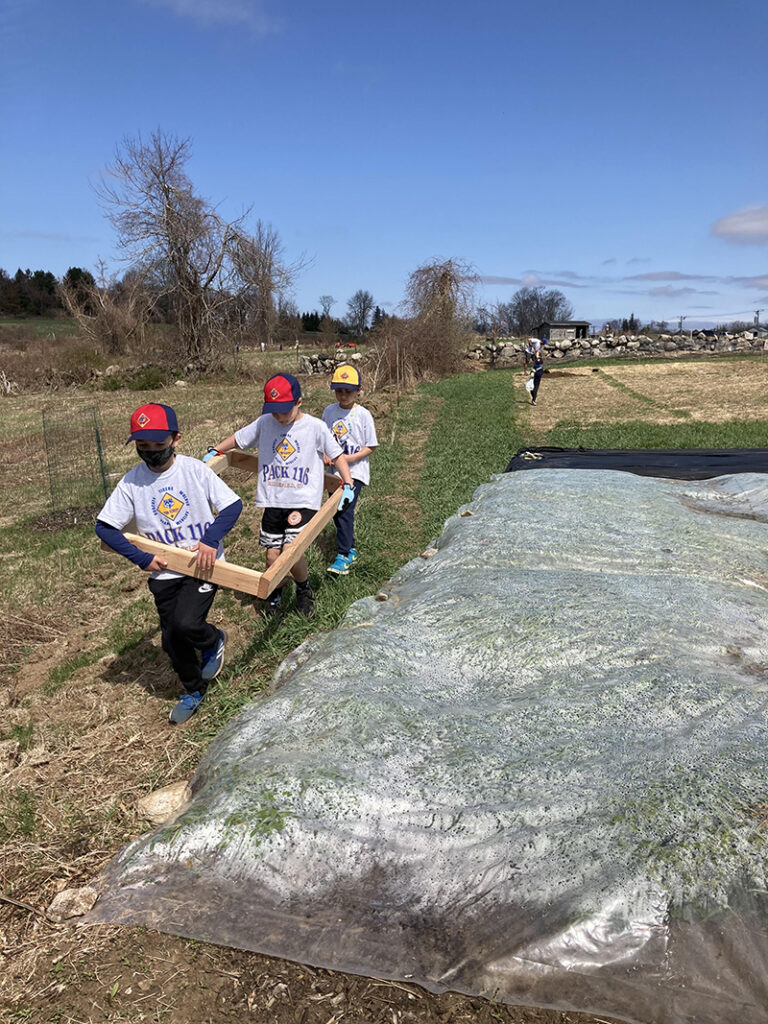During a Northeast Organic Farming Association of Connecticut (CT NOFA) conference in 2019, Evan Abramson, principal of Landscape Interactions, gave a presentation on local strategies for pollinator habitat creation and connectivity. With a mission of changing the way pollinator habitats are created, Abramson spoke about designing functionally diverse ecosystems that support at-risk bees and butterflies.
After hearing his talk and being inspired by his work, Norwalk River Watershed Association (NRWA) President Louise Washer and NRWA board member and Ridgefield Conservation Commissioner, Kitsey Snow met with Abramson and Robert Gegear, Ph.D. UMass Dartmouth biology professor and a scientific consultant at Landscape Interactions. With their Pollinator Pathway leader hats on, Washer and Snow discussed designing a landscape targeted to attract and feed native bees in Western Connecticut. After evaluating local spaces, Washer and Snow decided the town-owned McKeon Farm, a 200-year-old, 42-acre preserved area in Ridgefield, Connecticut, would be an ideal site for the project. The site includes a stonewall vegetable garden run by a nonprofit serving adults with disabilities and donating to local residents in need. Gegear visited the space to do a baseline study of the pollinators he observed on the property. Having a particular interest in rare and declining specialist bee species, he was intrigued when he discovered the presence of golden northern bumble bees (Bombus fervidus), a rare species that is in decline and in need of protection.
With clear synergy between Landscape Interactions’ focus on providing habitats for at-risk pollinators and Pollinator Pathway’s focus on establishing pollinator-friendly habitats and food sources, the groups decided to collaborate for the development of McKeon Farm as a bee-specific Pollinator Pathway site. They entered into a contract toward the end of 2019, and by 2020 began designing and building the pollinator garden, hoping to transform McKeon Farm into a regional biodiversity hotspot for targeted at-risk pollinator species.


Originally projected to be completed in three years, some unavoidable challenges hindered its progress, adding an additional two years to the project’s timeline. “Volunteers are a crucial component to its success, and with the genesis of the project lining up with the beginning of the COVID-19 pandemic, gathering the large amount of people needed to work on the garden was simply not an option,” Snow says.
Additionally, the years of established pasture grass made the sod-removal process extremely challenging. Though they’ve experienced moderate success from a couple of different methods, the turf has proven to be one of the greater obstacles in transforming the farm. Nevertheless, collaboration and persistence has kept the project moving forward.
To celebrate their newfound membership eligibility, some of Connecticut’s female Eagle Scout members decided their first official Eagle Scout project would be assisting in the development of the garden by helping clear the nearly 300 feet of invasive Asiatic bittersweet vines and Japanese barberry from the garden’s hedgerow. With the removal of the invasive plants, the hedgerow has seen substantial growth from native plants like meadowsweet (Spiraea alba), native roses (Rosa carolina and R. virginiana), honeysuckle (Diervilla lonicera), and more.
Along with the hedgerow, there is also meadow and a large slope on the property that leads to a wet meadow. The planted areas are varied, some with full sun/part shade and average-dry soil and others with full sun and moist-wet soils. In all, the project’s leaders selected about 70 different species of trees, shrubs, herbaceous perennials, vines, grasses and a meadow seed mix to provide the specialized food and habitat for declining native bees. Plantings will extend across McKeon Farm, with a goal of having at least 10,000 sq. ft. of pollinator plantings within the year. While some of the species have yet to take hold, especially those planted as seeds, many of the plants grew quickly and benefited the pollinators within the first season of planting, resulting in a hard-fought “win” for those who invested so much into the project.
Snow reiterated the patience and persistence this project has required, saying, “Yes, it can be frustrating when we think about how long it’s taking, but we are committed. Not only is this beneficial for at-risk pollinators, but it’s also a great citizen science project that encourages people to use web-based apps like Beecology (created by Gegear) and mobile apps like iNaturalist to help identify the bees and be a part of what’s happening in their community. This entire process may be going a lot slower than we first anticipated, but it’s worth our perseverance.”
You can learn more about the McKeon Farm project on the Ridgefield, CT website, the NRWA website, or watch their presentation here.

